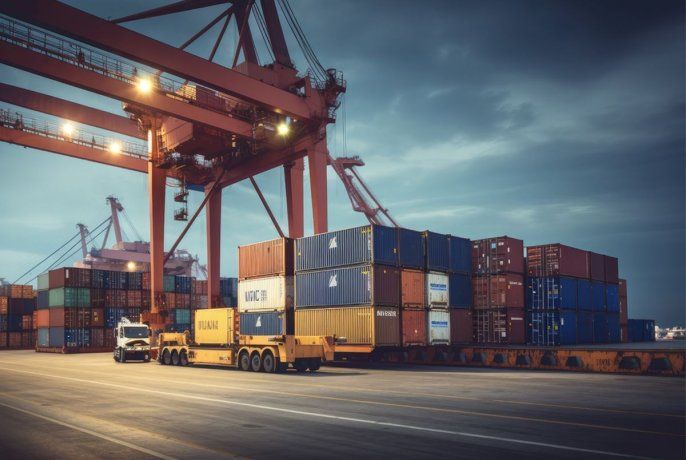Fernando Landa, president of the Chamber of Exporters (CERA), He assured in dialogue with Ámbito that he does not observe a conflict in terms of our exports to China. “That is not the underlying problem, perhaps it is more geopolitical. However, what is going to happen is that although there will not be a loss of market for Argentina, Brazil will benefit more from this.”
For Landa, “exports have not evolved favorably in recent times. Beyond the fact that we do not usually talk about the exchange rate, exports depend on investment and that depends on predictability and competitiveness, that is the issue for us.”
Miguel Schiariti, head of the Chamber of Industry and Commerce of Meat and Derivatives, pointed out to Scope that, for the moment, no substantial changes are perceived in Argentine trade policy, although the sector remains attentive to the possibility of an agreement with the United States. This understanding, anticipated during the week by the economic team, would seek to reduce tariffs for a hundred products from both countries, within the exceptions contemplated by Mercosur.
china usa trade war tariffs
The trade war between the US and China impacts the world.
Depositphotos
The interest of the US with Argentina and the role that China occupies
Currently, China is Argentina’s second trading partner, after Brazil, and is the second destination for Argentine exports. According to official data from CERA and INDEC, Argentina’s exports to China represented US$5,173 million (+12.2% annually). However, beyond the leadership that China maintains in trade for our countrythe US led the stock of Foreign Direct Investment, representing 17%, while China is in 14th place, with 2% with a presence in agriculture and mining.
Since Trump reactivated the trade war with China in April, Argentina was not left out of the escalation of reciprocal tariffs: Their exports were hit by a 10% rate, the lowest among those imposed by Washington. However, in the middle of the year, taxes on steel and aluminum increased from 25% to 50%, affecting an item that represented half of the total sales of these products to the US market in 2024.
To relieve this sector, the Government ordered a week ago the suspension of withholdings in order to boost exports, valid until December 31, 2025. “This measure seeks to strengthen export capacity and provide greater competitiveness to one of the country’s productive sectors, aligning policies with the principles of freedom and greater openness of trade that promote the growth of industrial value chains,” the Decree stated. 726/2025.
In parallel, Trump’s interest in Argentina is in the critical mineralsthe 5G and WiFi 6 technologyand in the sectors of energy, oil and gaswith the aim that the Argentina consolidates itself as a strategic supplier of lithium and copper for the United States.
China and the US: two opposing strategies
The economist Federico Vacarezzain dialogue with Ámbito, analyzed the differences between the strategies of both countries towards the region.
“There is a motto, a kind of prevailing doctrine in commercial diplomacy and that is that good political relations make for good commercial relations. China has many tools to put pressure on Argentina but, in any case, there is no Chinese animosity towards Argentina. I think they understand better than us the cyclical ups and downs not only in the economy but also in politics. China is building a long-term strategic relationship with Latin America. It has shown that it is not willing to tarnish your relationship due to a factor that may be temporary and circumstantial. On the other hand, the foreign policy of the United States is not directed by a strategic view towards Argentina but rather by a personalistic link between the US president and President Javier Milei,” said the economist.
Vacarezza added that, currently, the US does not have a clear strategy towards Latin America: “Currently, the United States has shown that it does not have a clear strategy towards the region. The policy towards Latin America today is determined by the volatile decisions of Donald Trump. There is nothing predictable. At this moment he can give a press conference saying that a country is his best ally, in two hours say that they are socialist idiots and two hours later say that they are excellent friends. Mexico, Brazil, Canada, Colombia and Chile, among others, understood this clearly. The countries of the region have long-term projects and seek predictability in their ties. “The United States is an important partner, but its regional influence has declined as much as its global influence.”
Although exporters closely follow what is happening in the trade war between China and the United States, the sector maintains that business with China At the moment they have not undergone any type of change. However, they are attentive to a possible trade agreement with the US and how the conflict between both powers will evolve in the coming months.
Exports containers.jpg

Foreign trade is the focus of Javier Milei’s Government, but it still faces problems that impact competitiveness.
Beyond the trade war: the problems of exporters
Currently, Argentine exporters face a series of challenges that go far beyond the trade dispute between the United States and China. In addition to the dollar, there are issues that are faced differently depending on the sector.
From the agro-export area, sources consulted by this means indicated that one of the main obstacles is linked to the deterioration of rural infrastructure. The recent floods seriously affected production and, consequently, exports. But the impact is not limited to climatic factors: the sector is also conditioned by high financing rateswhich make it difficult to access affordable credit to mitigate losses. Added to this are the complaints to the national government due to the poor condition of the routes, a situation that makes logistics more expensive and restricts the distribution of merchandise.
Another point that generates concern is the tax regime. “We continue to export taxes,” businessmen in the sector warned in dialogue with this medium. Although they recognize that a comprehensive tax reform would be an important advance, they point out that the delay in refunds and VAT recovery aggravates cash difficulties. “Refunds to exporters are being paid five or six months late. VAT recovery and refunds are the mechanisms that Argentina has to prevent exported products from charging local taxes. Today the problem is cash: needs are covered in pesos, but the cash ends up drowning in dollars,” Landa explained.
This context limits the ability to compete in international marketsespecially for the exporting SMEswho face high tax costs and a bureaucracy that discourages the opening of new commercial destinations, despite the important advances they recognize, and that were carried out by the Ministry of Commerce and the Ministry of Deregulation and Transformation of the State.
According to official data, In 2024, Argentina had 9,085 export companiesand that number grew slightly until it was around 9,200 for this year. However, the regional comparison shows the country’s difficulties: Chili and Peruwith smaller economies, have around 7,500 and 8,900 exportersrespectively. In this scenario, the sector’s conclusion is clear: currently there is a disincentive to exportand that problem completely transcends the situation of the trade war.
Source: Ambito




